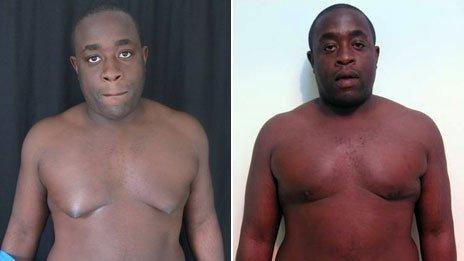Increase in male breast reduction surgery
- Published

Surgery has made a big difference to Ayo Adesina
The number of men in the UK undergoing breast reduction surgery is continuing to rise.
Figures from the British Association of Aesthetic Plastic Surgeons, external (BAAPS) show 790 men underwent the procedure in 2011.
That is more than double the number who had it five years earlier.
Thousands of men in the UK are thought develop breast tissue - a condition known as gynaecomastia.
It often causes embarrassment and discomfort - and at times - tenderness around the nipples.
It can occur in adolescent boys around the time of puberty. But figures say that at least 30% of those who have it are older men
Ayo Adesina, 29, developed gynaecomastia as a child.
"I think the first time I realised I was kind of different, I was probably eight or nine in primary school - we went swimming and realised I thought that my chest looks slightly different to the other boys", he said.
"It was very, very, very annoying. Everyone in the changing rooms would say 'Ayo, look at your little boobs' and stuff like that which was kind of hurtful. When I would look in the mirror, it does bother you so I decided it was time to do something about it".
Ayo decided after feeling too ashamed to take off his shirt on the beach, and in front of his girlfriends, that he had to take action, so he paid for a breast reduction.
The operation can be available on the NHS, but research suggests that some men find that route laborious - with far too much form-filling and red tape.
Some plastic surgeons believe that attitudes towards cosmetic procedures like liposuction are changing for the better.
Stigma reducing
Neil Bulstrode, Clinical Lead for plastic surgery at London's Great Ormond Street Hospital, said: "The stigma of plastic surgery is reducing - and also there's a realisation that simple safe procedures can be done to make big improvements in parts of the body that have been significantly affected and that can make a huge improvement on how people feel about themselves, their confidence, and therefore what they can achieve."
However, critics of plastic surgery say it can be a way of making money out of vulnerable people - and that people should not go under the knife unless it is for life-saving reasons.
The scandal over faulty PIP breast implants has also increased pressure for tighter regulation of the industry.
It is often assumed that gynaecomastia is simply linked to obesity - but there are other causes as well.
The condition can be provoked by an imbalance of the sex hormones oestrogen and testosterone.
It can also be triggered by certain medication like antidepressants, heart and liver pills, and some cancer drugs which are known for cutting levels of male hormones.
There is evidence that anabolic steroids can cause further breast tissue - and some experts are concerned that rising levels of female hormones in the environment can also play a part.
Little sympathy
But men who have gynaecomastia say there is little sympathy for them - with many believing their 'man boobs' are a consequence of a bad diet and little exercise.
At a gym on the outskirts of London - a group of men were breaking into a sweat on the weight lifting machines. They insisted that men with breasts can cure themselves.
"Just keep fit, go to the gym, play some sport, don't eat so much rubbish. Its just common sense really," one of the men said.
His friend shared his sentiments: "Man boobs is not something you're born with, it's just you get them if you don't look after yourself. You just got to stop eating crisps and doughnuts and take care of your body."
Their words are frustrating to hear for men who have gynaecomastia, and in some cases, it is exactly that sentiment that has led them to surgery.
The rise in men having breast reductions reflects what is happening in the multi-billion pound industry as a whole.
Despite tough economic times the number of surgical procedures in 2011 increased by 5.8% from 2010 when there were a total of 43,069 procedures in the UK.
For Ayo, its changed his life. He says he is a new man - both physically and psychologically.
"I'm very happy indeed with the results. I don't have an Arnold Schwarzenegger body, but I think it's made me even more determined to have the body that I would like and I think I'm on a level playing field with everybody else."
- Published31 January 2011